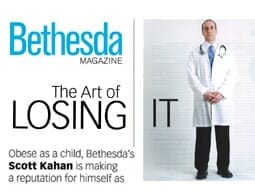Originally published in The Huffington Post.
By now, virtually everyone reading this is familiar with the alarming stats on obesity rates and the health outcomes associated with excess weight. And by now, we’ve all had a chance to develop our own opinions about what obesity is and why most of us are getting fat. Here’s mine:
Obesity is a chronic medical condition – i.e., a disease.
And few people would disagree with me…if we all weren’t so blinded by the sight of heavy people.
Let’s assume, for a moment, that obesity was not associated with having excess weight. That is, imagine if eating too much led to all the health consequences of obesity – e.g., elevated cholesterol, “hardening” of the arteries, enlargement of the heart, growth of cancerous cells – but not an overt and outward gaining of weight. If we were blind to the aesthetics of obesity, would anyone fail to see it as a disease?
From a technical perspective, obesity fits any reasonable definition of disease. According to my medical dictionary, a disease is:
- “An impairment of the body or one of its parts resulting from various causes, such as infection, genetic defect, or environmental stress, and characterized by an identifiable group of signs or symptoms.”
Let’s see…
…an impairment of the body. Check.
Obesity goes way beyond its outward appearance. Most affected people develop a cluster of metabolic, hormonal, and cellular disruptions – so much so that having obesity increases the risk of dozens of other chronic diseases, and ultimately premature death.
…resulting from various causes. Check.
Obesity doesn’t just “happen.” It usually results from a constellation of drivers (genetics, environment, medical disorders, stress, and many others) that interact with our conscious decision-making processes, leading to the consumption of more calories than are “burned off” by movement and metabolism.
…characterized by an identifiable group of signs or symptoms. Check.
Weight gain, difficulty moving, diminished breathing capacity, skin changes, joint pain, to name a few.
A disease is a dis-ease of a part of the body. Clinical depression is a disease. So is a broken bone. So is severe acne. And so is obesity. That most people generally don’t define these as diseases is a matter of convention, not fact.
Medically, obesity is no different from other chronic diseases. Consider the similarities between obesity, hypertension (“high blood pressure”), and type 2 diabetes:
- Each involves malfunctions of intricately regulated systems: blood pressure in the case of hypertension, blood sugar in the case of diabetes, and energy balance and body weight in the case of obesity. Each has significant genetic predispositions and can ultimately result in serious health consequences.
- Each is associated with unhealthy diets and physical inactivity. This is essential to appreciate. The eating and inactivity patterns that lead to excess weight gain in susceptible people are the same ones that lead to chronic diseases in others – even in “skinny” people.
The National Institutes of Health, the World Health Organization, and numerous other scientific organizations regard obesity as a disease, yet most people continue to dismiss obesity as a “willful misconduct” and label people who have obesity as lazy and weak.
Sure, there’s an element of choice – personal decisions and behaviors are a central piece of most chronic diseases. But poor food and physical activity decisions aren’t exclusive to people with obesity. It’s just that we plainly see evidence of their unhealthy behaviors – on their bellies and hips and thighs – whereas thin people wear their unhealthy decisions on the inside, hidden from scrutiny.
In fact, the vast majority of Americans, regardless of weight, are eating unhealthily and barely moving. In many cases, people with obesity aren’t eating worse or moving less than skinny people. Yet while we instinctively comfort and support normal-weight persons who suffer from hypertension or diabetes or other chronic diseases, even though unhealthy eating and inactivity were likely involved in developing those diseases, we ridicule and punish persons with obesity. Even doctors aren’t immune to this stigma.
Such misperceptions and prejudices get in the way of our collective ability to fully understand, prevent, and treat this disease.
We should extend to persons with obesity the same respect that we extend to those suffering from other chronic diseases – including access to appropriate and evidence-based treatments. Doing so doesn’t negate the importance of taking a central role in managing their health, any more than prescribing blood pressure medications to persons with hypertension obviates the need for their healthy eating and physical activity.
Most importantly, our focus needs to shift from blame and ridicule to working together to address the “obesogenic” environment, which shapes our personal decisions and health outcomes. Policies and preventive options that address the physical and social environment (such as the economics of food production, access to healthy foods, junk food marketing, and many other factors) to make healthy lifestyle choices the default would benefit everyone, regardless of weight.









